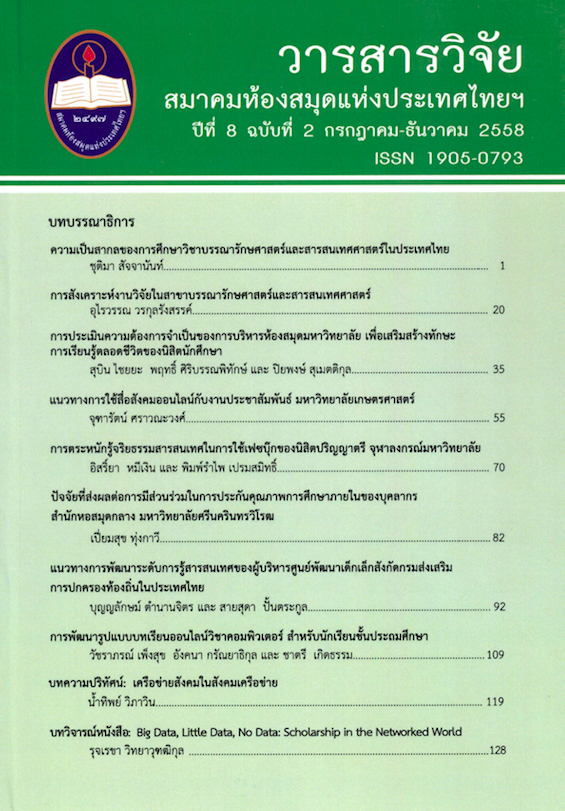ความเป็นสากลของการศึกษาวิชาบรรณารักษศาสตร์และสารสนเทศศาสตร์ ในประเทศไทย
Main Article Content
Abstract
การวิจัยนี้มีวัตถุประสงค์เพื่อสังเคราะห์กรอบแนวคิดความเป็นสากล สภาพการพัฒนา ความเป็นสากล และแนวปฏิบัติที่ดีในการพัฒนาความเป็นสากล และพัฒนายุทธศาสตร์การพัฒนาความเป็นสากลของสถาบันการศึกษาวิชาบรรณารักษศาสตร์และสารสนเทศศาสตร์ในประเทศไทย การวิจัยนี้เป็นการวิจัยเชิงพัฒนา ใช้ระเบียบวิธีวิจัยแบบผสมผสาน ทั้งการวิจัยเอกสาร การวิจัยเชิงคุณภาพและการวิจัยเชิงปริมาณ ผู้ให้ข้อมูลหลัก เลือกแบบเจาะจง ตามเกณฑ์ที่กาหนดประกอบด้วย ผู้ทรงคุณวุฒิผู้มีความรู้ ผลงานและประสบการณ์เกี่ยวข้องกับความเป็นสากลของการจัดการศึกษาระดับบัณฑิตศึกษา สาขาวิชาบรรณารักษศาสตร์และสารสนเทศศาสตร์ ชาวไทยจานวน 12 คน และชาวต่างประเทศจานวน 6 คน คณบดี/หัวหน้าโปรแกรม/ภาควิชา/สถาบันการศึกษาวิชาบรรณารักษศาสตร์และสารสนเทศศาสตร์ในประเทศไทยที่เปิดสอนระดับบัณฑิตศึกษา จานวน 9 คน กลุ่มผู้บริหาร อาจารย์ นักวิชาการ นักวิชาชีพ ผู้เกี่ยวข้องและมีส่วนได้ส่วนเสีย จานวน 34 คน เครื่องมือการวิจัย ประกอบด้วย แบบบันทึกข้อมูล แบบสัมภาษณ์ แบบสนทนากลุ่มและแบบสอบถาม การวิเคราะห์ข้อมูล ข้อมูลเชิงคุณภาพ ใช้การวิเคราะห์และสังเคราะห์ เนื้อหา และสรุปความ ข้อมูลเชิงปริมาณ หาความถี่ ร้อยละและค่าดัชนีความสอดคล้อง
ผลการวิจัยพบว่า 1) ความเป็นสากลยังเป็นคาที่มีการอธิบายและตีความในบริบทและมุมมองแตกต่างกัน กรอบแนวคิดความเป็นสากลวิเคราะห์ในมิติของกิจกรรม กระบวนการ วัฒนธรรม และ สมรรถนะหรือผลลัพธ์ เพื่อพัฒนาคุณภาพมาตรฐานและสร้างความเป็นเลิศของสถาบัน 2) สภาพการพัฒนาความเป็นสากลพบว่าทุกสถาบันที่เปิดสอนระดับบัณฑิตศึกษามีการดาเนินการในด้านการบริหารจัดการและการจัดการศึกษา และมหาวิทยาลัยที่เปิดสอนระดับปริญญาเอก ได้แก่ มหาวิทยาลัยขอนแก่น และมหาวิทยาลัยสุโขทัยธรรมาธิราช รวมทั้งมหาวิทยาลัยมหาสารคาม ซึ่งมีแผนเปิดสอนอยู่ในสามสถาบันนา 3) แนวปฏิบัติที่ดีจากกรณีศึกษาการพัฒนาความเป็นสากลในภูมิภาคที่แตกต่างกันแสดงให้เห็นการพัฒนาความเป็นสากลโดยการกาหนดยุทธศาสตร์การจัดการศึกษา การเปิดสอนหลักสูตรนานาชาติการจัดประชุมนานาชาติ การบูรณาการในการเรียนการสอนและการวิจัย การใช้เทคโนโลยีสารสนเทศและการสื่อสารขยายพรมแดนความเป็นสากล และการทางานแบบหุ้นส่วนเชิงกลยุทธ์ และ 4) ยุทธศาสตร์การพัฒนาความเป็นสากล ครอบคลุมยุทธศาสตร์หลัก ประกอบด้วย เครือข่ายและหุ้นส่วนเชิงกลยุทธ์ การย้ายถิ่นและแลกเปลี่ยน การซึมซับและความยืดหยุ่น และยุทธศาสตร์ระดับสถาบัน จาแนกเป็นสี่ด้าน ได้แก่ ด้านการบริหารจัดการ ด้านการจัดการศึกษา ด้านการวิจัย และด้านการบริการทางวิชาการ โดยแต่ละด้านมีรายการยุทธศาสตร์ภายในกรอบแนวคิด “สร้างอัตลักษณ์” และบริบทของสถาบัน
Internationalization of Library and Information Science Education in Thailand
Chutima Sacchanand
B.A. (Library Science), Dip. In Teaching, M.A. (Library Science) Chulalongkorn University
This study aimed at synthesizing the concept of the internationalization; studying the status of the internationalization of LIS schools in Thailand, and the best practices of the internationalization, and 4) developing strategies for the internationalization of LIS schools in Thailand. This research and development used mixed methods, both quantitative and qualitative research. The purposive sample group consisted of documents, twelve Thai and six foreign key informants who have knowledge and experience related to LIS internationalization, deans /head departments/ programs of nine LIS schools and thirty four LIS academicians and professionals. The research instruments comprised documentary analysis form, interview/focus group interview forms and questionnaire. Data analyses were both content analysis for qualitative data and frequency, percentage and IOC for quantitative data.
Research findings showed that: 1) the word internationalization has varied in the explanation and interpretation in different perspectives and context, and can be grouped in terms of activities, processes, culture and competencies of results, to develop quality, standards and excellence of the institutions; 2) all LIS graduate schools in Thailand implement internationalization in educational management and provision, it was also found that Khonkaen University and Sukhothai Thammathirat Open University which offer Ph.D programs as well as Mahasarakarm University which plans to do are the three leading institutions which implement internationalization in all areas; 3) the five different case studies in various continents showed the internationalization of LIS schools /programs in developing strategies, the international curriculum, organizing the international conferences, the integration in the teaching and learning and the research, the ICT–based model of internationalization, and the strategic partnership model; and 4) internationalization strategies of LIS schools /programs in Thailand include four main components: network and strategic partnership, mobility and exchange, infusion, and flexibility. At the institutional level, four specific areas: management, educational provision, research, and academic services with sub-strategies have been identified, on which each LIS institution can focus according to its identity and context.
Article Details
บทความทุกเรื่องที่ลงตีพิมพ์จะได้รับการตรวจอ่านโดยผู้ทรงคุณวุฒิ ความคิดเห็นและบทความที่ปรากฏในวารสารนี้ เป็นของผู้เขียนซึ่งมิใช่เป็นความคิดเห็นของคณะผู้จัดทำ และมิใช่ความรับผิดชอบของสมาคมห้องสมุดแห่งประเทศไทยฯ การนำบทความในวารสารนี้ไปตีพิมพ์ซ้ำต้องได้รับอนุญาตจากคณะผู้จัดทำ
All articles submitted for publication will be reviewed by the academic reviewers. The editorial board and TLA claim no responsibility for the content or opinions expressed by the authors of individual articles or columns in this journal. Reprinting of any articles in this journal must be permitted by the editorial board.


